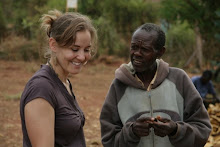
When I first returned to Africa in 2007 I found myself in an area with the highest HIV/Aids infection rates in the continent. Kwa Zulu Natal is the land of South Africa’s greatest and fiercest warriors, whose descendents have been crippled by a disease against which spears have no effect. A hardened development professional I met with after my return was quick to point out I’d never walked the rows of a children’s Aids' ward in west Africa where babies lay listless and ready to die. But I found the experience of living with Lindokuhle in the days before her death alongside the knowledge (confirmed two years later) that Noluvo’s lungs would someday give out was sufficient to drive home the devastation of this epidemic and the undeserved affliction of the youngest generation.
During that time I struggled to understand the seeming chaos of such inequality and powerlessness. While my nephews and nieces at home were thriving these children were covered in sores, abandoned by parents or surviving family members, scarred by abuse at the hands of impoverished caretakers. But each morning I would awake to laughter, singing and the sound of prayer over breakfast. And each afternoon as uniformed little bodies returned from school the yard would erupt in vibrant activity and the energetic throng of children’s energy. And eventually I understood, that as each of these growing beings had already faced challenges far beyond my comprehension, they remained children – not yet whole as individuals. There was room for hope that with the love and support of this home and the people that had taken them in they would triumph over scarred pasts. Such hope gave way to a bigger hope, that this region would begin to respond to the outreach of the health workers, to the growing awareness and education about how to protect itself from this disease. And this, in turn, gave way to hope that the global community would take greater notice, would make better choices holding this country accountable to the reality of the epidemic, using what capitol we could to encourage education, treatment and equal access to opportunity. And so I left with the understanding that in the deepest and darkest recesses of humanity, there is always room for hope.
Last night I returned from a visit to the boys’ homes in Nakuru. It was a delightful weekend although the same challenges continue to plague one group especially – how do you break boys who have been on the streets fending for themselves of the habit of doing the same when their needs are being provided for? I found myself worrying over the little boys who are, like all kids, vulnerable to the world around them. Growing in response to external forces, being moulded into people who can survive the world they are a part of. Here I was hoping for them to remain soft and innocent – and yet such traits would likely lead to their great disadvantage in the long term.
So I returned home and as I lay in bed last night I began to pray. I let go of any anxiety built up over the days as I acknowledged my role as a witness and a participant rather than an engineer. I asked for patience, for grace, for guidance, for faith. I prayed for these boys, for relationships, for humanity. And I found hope, and peace.
Please forgive the delays in posting - the internet is not cooperating with my 1 post per day plan!




